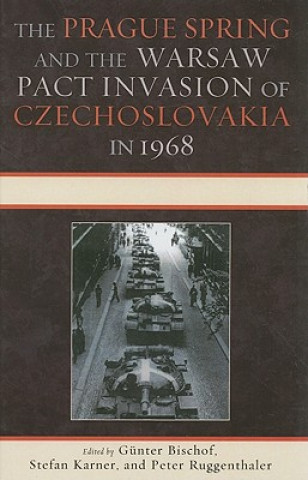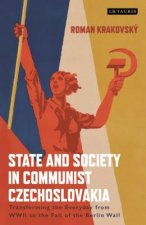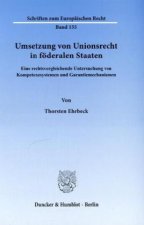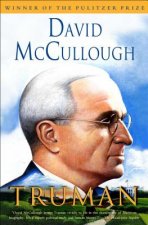
Kód: 04903526
Prague Spring and the Warsaw Pact Invasion of Czechoslovakia in 1968
Autor Gunter Bischof
On August 20, 1968, tens of thousands of Soviet and East European ground and air forces moved into Czechoslovakia and occupied the country in an attempt to end the "Prague Spring" reforms and restore an orthodox Communist regime. ... celý popis
- Jazyk:
 Angličtina
Angličtina - Vazba: Pevná
- Počet stran: 530
Nakladatelství: Lexington Books, 2009
- Více informací o knize

Mohlo by se vám také líbit
-

Communism in Czechoslovakia, 1948-1960
3055 Kč -

State and Society in Communist Czechoslovakia
1514 Kč -

Skull-face Bookseller Honda-san, Vol. 2
321 Kč -

Prague Spring
242 Kč -

Saints+Sinners 2017
455 Kč -

Higher Reality
484 Kč -

Wanted - Movie Edition
554 Kč -

Window Gardening the Old-Fashioned Way
319 Kč -

Pappy
558 Kč -

Unraveling DNA
510 Kč -

Notes on Schubert
449 Kč -

Umsetzung von Unionsrecht in föderalen Staaten.
2111 Kč -

Perfect World, 1 Blu-ray
245 Kč -

Domani
720 Kč
Dárkový poukaz: Radost zaručena
- Darujte poukaz v libovolné hodnotě a my se postaráme o zbytek.
- Poukaz se vztahuje na celou naši nabídku.
- Elektronický poukaz vytisknete z e-mailu a můžete ihned darovat.
- Platnost poukazu je 12 měsíců od data vystavení.
Více informací o knize Prague Spring and the Warsaw Pact Invasion of Czechoslovakia in 1968
Nákupem získáte 598 bodů
 Anotace knihy
Anotace knihy
On August 20, 1968, tens of thousands of Soviet and East European ground and air forces moved into Czechoslovakia and occupied the country in an attempt to end the "Prague Spring" reforms and restore an orthodox Communist regime. The leader of the Soviet Communist Party, Leonid Brezhnev, was initially reluctant to use military force and tried to pressure his counterpart in Czechoslovakia, Alexander Dubcek, to crack down. But during the summer of 1968, after several months of careful deliberations, the Soviet Politburo finally decide that military force was the only option left. A large invading force of Soviet, Polish, Hungarian, and Bulgarian troops received final orders to move into Czechoslovakia; within 24 hours they had established complete military control of Czechoslovakia, bringing an end to hopes for "socialism with a human face." Dubcek and most of the other Czechoslovak reformers were temporarily restored to power, but their role from late August 1968 through April 1969 was to reverse many of the reforms that had been adopted. In April 1969, Dubchek was forced to step down for good, bringing a final end to the Prague Spring. Soviet leaders justified the invasion of Czechoslovakia by claiming that "the fate of any socialist country is the common affair of all socialist countries" and that the Soviet Union had both a "right" and a "sacred duty" to "defend socialism" in Czechoslovakia. The invasion caused some divisions within the Communist world, but overall the use of large-scale force proved remarkably successful in achieving Soviet goals. The United States and its NATO allies protested but refrained from direct military action and covert operations to counter the Soviet-led incursion into Czechoslovakia. The essays of a dozen leading European and American Cold War historians analyze this turning point in the Cold War in light of new documentary evidence from the archives of two dozen countries and explain what happened behind the scenes. They also reassess the weak response of the United S
 Parametry knihy
Parametry knihy
Zařazení knihy Knihy v angličtině Humanities History History: earliest times to present day
5984 Kč
- Plný název: Prague Spring and the Warsaw Pact Invasion of Czechoslovakia in 1968
- Autor: Gunter Bischof
- Jazyk:
 Angličtina
Angličtina - Vazba: Pevná
- Počet stran: 530
- EAN: 9780739143049
- ISBN: 0739143042
- ID: 04903526
- Nakladatelství: Lexington Books
- Hmotnost: 912 g
- Rozměry: 245 × 168 × 35 mm
- Datum vydání: 29. December 2009
Oblíbené z jiného soudku
-

24 Hours in Ancient Athens
346 Kč -

Chernobyl Prayer
286 Kč -

Infidel
286 Kč -

Knights and the Golden Age of Chivalry, The Illustrated History of
510 Kč -

Ivory Vikings
587 Kč -

From Third World to First
389 Kč -

On Tyranny
286 Kč -

Meditations
214 Kč -

Histories
136 Kč -

The Origins of Totalitarianism
286 Kč -

Peloponnesian War
330 Kč -

Lives of the Caesars
288 Kč -

Making Medieval Manuscripts
454 Kč -

Oxford History of Poland-Lithuania
1709 Kč -

Guns, Germs, and Steel
296 Kč -

Illustrated Encyclopedia of Uniforms of World War I
543 Kč -

Rise and Fall of Ancient Egypt
464 Kč -

Postwar
462 Kč -

Underground
306 Kč -

Tuesdays With Morrie
286 Kč -

Chickenhawk
303 Kč -

King Leopold's Ghost
303 Kč -

Swerve
280 Kč -

Distant Mirror
357 Kč -

Complete Roman Army
543 Kč -

Age Of Capital
410 Kč -

End of Days
193 Kč -

Creation of Patriarchy
651 Kč -

Age Of Extremes
473 Kč -

John Skylitzes: A Synopsis of Byzantine History, 811-1057
972 Kč -

America's Secret Establishment
400 Kč -

Key of Solomon the King (Clavicula Salomonis)
279 Kč -

Travels of Ibn Battutah
303 Kč -

King's Two Bodies
679 Kč -

On Ancient Warfare
1017 Kč -

Medieval Europe
397 Kč -

Caligula
90 Kč -

1913
303 Kč -

Armies of the Late Roman Empire AD 284 to 476
945 Kč -

Aquariums of Pyongyang
303 Kč -

Truman
514 Kč -

Anunnaki Homeworld
425 Kč -

Medusa
524 Kč -

Eros and Magic in the Renaissance
1025 Kč -

History of the Ancient World
765 Kč -

Who Paid The Piper?
358 Kč -

Thank You for Being Late
358 Kč -

Your Money or Your Life - Economy & Religion in The Middle Ages
501 Kč -

Cartoon History of the Universe III
550 Kč
Osobní odběr Praha, Brno a 12903 dalších
Copyright ©2008-24 nejlevnejsi-knihy.cz Všechna práva vyhrazenaSoukromíCookies



 Vrácení do měsíce
Vrácení do měsíce 571 999 099 (8-15.30h)
571 999 099 (8-15.30h)